#and the two women had a relationship that woolf described as romantic :)
Explore tagged Tumblr posts
Text
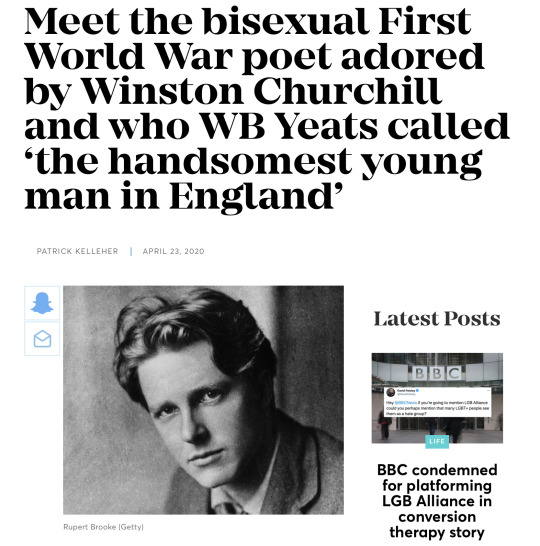
It is 105 years today since Rupert Brooke, the bisexual poet who was described by WB Yeats as “the handsomest young man in England”, died.
Today, Brooke is remembered as one of a group of war poets who chronicled the First World War in Britain. While poets like Siegfried Sassoon and Wilfred Owen are remembered for their unflinchingly grim portrayal of life on the front line, Brooke is best remembered for his idealistic war sonnets such as The Soldier.
Brooke was already a revered poet by the time he died at just 27-years-old in 1915 – two of his war poems were published by The Times Literary Supplement that same year – but he also had a fascinating personal life, in which he struggled to understand his own sexuality.
After studying at the University of Cambridge, Brooke became involved with the legendary Bloomsbury Group, which included a number of historic gay writers such as EM Forster, Duncan Grant and John Maynard Keynes. Virginia Woolf, who was bisexual, was one of the group’s most influential members.
Rupert Brooke had sexual relationships with both men and women, but he struggled to accept that he was bisexual.
Surviving letters suggest that Rupert Brooke was attracted to men and women, and had sex with both during his lifetime. However, they also show that he struggled enormously to understand and accept his bisexuality.
In 1912, Brooke suffered an emotional crisis as he became increasingly confused and dismayed by his attraction to men and women. This crisis brought about an end to his relationship with Katherine Laird Cox. While he had a number of other romantic relationships with women, he was never able to reconcile himself with his bisexuality.
Writing in Taking It Like a Man, Adrian Caeser says Brooke considered “the bisexual position to be impossible” and believed his sexuality would prevent him from loving anyone wholeheartedly.
Brooke was “deeply uncertain as to his sexual identity, but seems to have wished to choose either homosexuality or heterosexuality”, Caesar writes.
“The bisexual option seems either not to have been available to him, or if it was, it does not seem to have impinged upon Brooke’s consciousness.”
Some of Brooke’s confusion came from the fact that he operated in social circles that were gay or straight – but he knew nobody else who inhabited an in-between space as he did.
His struggle was exacerbated by living in a society in which harsh, puritanical views around sexuality were common. People in early 20th century Britain were expected to adhere to strict social expectations around sexuality and sexual expression. Bisexuality was, quite simply, invisible.
The bisexual option seems either not to have been available to him, or if it was, it does not seem to have impinged upon Brooke’s consciousness.
“In choosing either one or the other he was denying himself, but the pressure was clearly very great to make this choice,” Caesar wrote.
In 1914, the First World War broke out, and Brooke soon enlisted, paving the way for him to become a war poet. Tragically, Brooke did not live long. He contracted sepsis from a mosquito bite while sailing with the British Mediterranean Expeditionary Force in February 1915. On April 23, he died aboard a French hospital ship.
One month later, his most famous poetry collection 1914 and Other Poems was published, and went on to become a bestseller in Britain.
Winston Churchill described him as ‘joyous, fearless, versatile’ in an obituary.
Brooke was held in such high esteem that Winston Churchill wrote an obituary for him in The Times newspaper. Churchill said Brooke’s life had “closed at the moment when it seemed to have reached its springtime”.
“A voice had become audible, a note had been struck, more true, more thrilling, more able to do justice to the nobility of our youth in arms engaged in this present war, than any other more able to express their thoughts of self-surrender, and with a power to carry comfort to those who watch them so intently from afar.
He continued: “The voice has been swiftly stilled. Only the echoes and the memory remain; but they will linger.”
“Joyous, fearless, versatile, deeply instructed, with classic symmetry of mind and body, ruled by high undoubting purpose, he was all that one would wish England’s noblest sons to be in the days when no sacrifice but the most precious is acceptable, and the most precious is that which is most freely proffered,” he concluded.
105 years after his death, Brooke is still held in high esteem by literary critics – and his sexuality has remained a talking point for much of that time.
#bisexuality#lgbtq community#bi#lgbtq#support bisexuality#bisexuality is valid#lgbtq pride#bi tumblr#pride#bi pride#bisexual poetry#rupert brooke#poetry#lgbt poetry#lgbt poem#bisexual poem#bisexual education#bisexual history#bisexual icon#bisexual nation#bisexual activism#bisexual activist#bi positivity#bi history#bisexual#bisexual community#bisexual people#support bisexual people#respect bisexual people
137 notes
·
View notes
Text
“...The letters, biographies, memoirs, and diaries that recorded Victorian women’s lives are essential sources for differentiating friendship, erotic obsession, and sexual partnership between women. The distinctions are subtle, for Victorians routinely used startlingly romantic language to describe how women felt about female friends and acquaintances. In her youth, Anne Thackeray (later Ritchie) recorded in an 1854 journal entry how she “fell in love with Miss Geraldine Mildmay” at one party and Lady Georgina Fullerton “won [her] heart” at another. In reminiscences written for her daughter in 1881, Augusta Becher (1830–1888) recalled a deep childhood love for a cousin a few years older than she was: “From my earliest recollections I adored her, following her and content to sit at her feet like a dog.”
At the other extreme of the life cycle, the seventy one-year-old Ann Gilbert (1782–1866), who cowrote the poem now known as “Twinkle, Twinkle, Little Star,” appreciatively described “the latter years of . . . friendship” with her friend Mrs. Mackintosh as “the gathering of the last ripe figs, here and there, one on the topmost bough!” Gilbert used similar imagery in an 1861 poem she sent to another woman celebrating the endurance of a friendship begun in childhood: “As rose leaves in a china Jar / Breathe still of blooming seasons past, / E’en so, old women as they are / Still doth the young affection last.” Gilbert’s metaphors, drawn from the language of flowers and the repertoire of romantic poetry, asserted that friendship between women was as vital and fertile as the biological reproduction and female sexuality to which figures of fruitfulness commonly alluded.
Friendship was so pervasive in Victorian women’s life writing because middle-class Victorians treated friendship and family life as complementary. Close relationships between women that began when both were single often survived marriage and maternity. In the Memoir of Mary Lundie Duncan (1842) that Duncan’s mother wrote two years after her daughter’s early death at age twenty-five, the maternal biographer included many letters Duncan (1814–1840) wrote to friends, including one penned six weeks after the birth of her first child: ��My beloved friend, do not think that I have been so long silent because all my love is centered in my new and most interesting charge. It is not so. My heart turns to you as it was ever wont to do, with deep and fond affection, and my love for my sweet babe makes me feel even more the value of your friendship.”
Men respected women’s friendships as a component of family life for wives and mothers. Charlotte Hanbury’s 1905 Life of her missionary sister Caroline Head included a letter that the Reverend Charles Fox wrote to Head in 1877, soon after the birth of her first child: “I want desperately to see you and that prodigy of a boy, and that perfection of a husband, and that well-tried and well-beloved sister-friend of yours, Emma Waithman.” Although Head and Waithman never combined households, their regular correspondence, extended visits, and frequent travels were sufficient for Fox to assign Waithman a socially legible status as an informal family member, a “sister-friend” listed immediately after Head’s son and husband.
In A Room of One’s Own, Virginia Woolf lamented that a woman born in the 1840s would not be able to report what she was “doing on the fifth of April 1868, or the second of November 1875,” for “[n]othing remains of it all. All has vanished. No biography or history has a word to say about it.” Yet as an avid reader of Victorian life writing, Woolf had every reason to be aware that in the very British Library where her speaker researches her lecture, hundreds of autobiographies, biographies, memoirs, diaries, and letters provided exhaustive records of what women did on almost every day of the nineteenth century.
One cannot fault Woolf excessively for having discounted Victorian women’s life writing, for even today few consult this corpus and no scholar of Victorian England has used it to explore the history of female friendship. Scholars of autobiography concentrate on a handful of works by exceptional women, and historians of gender and sexuality have drawn primarily on fiction, parliamentary reports, journalism, legal cases, and medical and scientific discourse, which emphasize disruption, disorder, scandal, infractions, and pathology. Life writing, by contrast, emphasized ordinariness and typicality, which is precisely what makes it a unique source for scholarship.
The term “life writing” refers to the heterogeneous array of published, privately printed, and unpublished diaries, correspondence, biographies, autobiographies, memoirs, reminiscences, and recollections that Victorians and their descendants had a prodigious appetite for reading and writing. Literary critics have noted the relative paucity of autobiographies by women that fulfill the aesthetic criteria of a coherent, self-conscious narrative focused on a strictly demarcated individual self. Women’s own words about their lives, however, are abundantly represented in the more capacious genre of life writing, defined as any text that narrates or documents a subject’s life.
The autobiographical requirement of a unified individual life story was irrelevant for Victorian life writing, a hybrid genre that freely combined multiple narrators and sources, and incorporated long extracts from a subject’s diaries, correspondence, and private papers alongside testimonials from friends and family members. A single text might blend the journal’s dailiness and immediacy and a letter’s short term retrospect with the long view of elderly writers reflecting on their lives, or the backward and forward glances of family members who had survived their subjects.
For example, Christabel Coleridge was the nominal author of Charlotte Mary Yonge: Her Life and Letters (1903), but the text begins by reproducing an unpublished autobiographical essay Yonge wrote in 1877, intercalated with remarks by Coleridge. The sections of the Life written by Coleridge, conversely, consist of long extracts from Yonge’s letters that take up almost as much space as Coleridge’s own words. Coleridge undertook the biography out of personal friendship for Yonge, and its dialogic form mimics the structure of a social relationship conducted through conversation and correspondence.
The biographer was less an author than an editor who gathered and commented on a subject’s writings without generating an autonomous narrative of her life. Reticence was paradoxically characteristic of Victorian life writing, which was as defined by the drive to conceal life stories as it was indicative of a compulsion to transmit them. This was true of life writing by and about men as well as by and about women. The authors of biographies often did not name themselves directly. Instead they subsumed their identities into those of their subjects. Authors who knew their subjects intimately as children, spouses, or parents usually adopted a deliberately impersonal tone, avoiding the first person whenever possible.
In her anonymous biography of her daughter Mary Duncan, for example, Mary Lundie completely avoided writing in the first person and was sparing even with third-person references to herself as Duncan’s “surviving parent” or “her mother” (243, 297). The materials used in biographies and autobiographies were similarly discreet, and the diaries that formed the basis of much life writing revealed little about their authors’ lives. Victorian life writers who published diary excerpts valued them for their very failure to unveil mysteries, often praising the diarist’s “reserve” and hastening to explain that the diaries cited did “not pretend to reveal personal secrets.”
Although we now expect diaries to be private outpourings of a self confronting forbidden desires and confiding scandalous secrets, only a handful of authenticated Victorian diaries recorded sexual lives in any detail, and none can be called typical. Unrevealing diaries, on the other hand, were plentiful in an era when keeping a journal was common enough for printers to sell preprinted and preformatted diaries and locked diaries were unusual. Preformatted diaries adopted features of almanacs and account books, and journals synchronized personal life with the external rhythms of the clock, the calendar, and the household, not the unpredictable pulses of the heart.
Diaries were rarely meant for the diarist’s eyes alone, which explains why biographers had no compunction about publishing large portions of their subjects’ journals with no prefatory justifications. Girls and women read their diaries aloud to sisters or friends, and locked diaries were so uncommon that Ethel Smyth, born in 1858, still remembered sixty years later how her elders had disapproved when she started keeping a secret diary as a child. Some diarists even explicitly wrote for others, sharing their journals with readers in the present and addressing them to private and public audiences in the future. By the 1840s, published diaries had created a popular consciousness, and self-consciousness, about the diary form.
In 1856, at age fourteen, Louisa Knightley (1842–1913), later a conservative feminist philanthropist, began to keep journals “written with a view to publication” and modeled on works such as Fanny Burney’s diaries, published in 1842. When the working-class Edwin Waugh began to keep a diary in 1847, his first step was to paste into it newspaper clippings about how to keep a journal. One young girl included diary extracts in letters to her cousin in the 1840s. Princess Victoria was instructed in how to keep a daily journal by her beloved governess, Lehzen, and until Victoria became Queen, her mother inspected her diaries daily.
Diarists often wrote for prospective readers and selves, addressing journal entries to their children, writing annual summaries that assessed the previous year’s entries, or rereading and annotating a life’s worth of diaries in old age. Journals were a tool for monitoring spiritual progress on a daily basis and over the course of a lifetime. Diarists periodically reread their journals so that by comparing past acts with present outcomes they could improve themselves in the future. A Beloved Mother: Life of Hannah S. Allen. By Her Daughter (1884) excerpted a journal Allen (1813–1880) started in 1836 and then reread in 1876, when she dedicated it to her daughters: “To my dear girls, that they may see the way in which the Lord has led me.”
Far from being a repository of the most secret self, the diary was seen as a didactic legacy, one of the links in a family history’s chain. Victorian women’s diaries combined impersonality with lack of incident. Although Marian Bradley (1831–1910) wrote, “My diary is entirely a record of my inner life—the outer life is not varied. Quiet and pleasant but nothing worth recording occurs,” she in fact devoted hundreds of pages to recording an outer life that she accurately characterized as regular and predictable. Indeed, the stability and relentless routine that diaries labored to convey goes far to explain why Victorians were so eager to read the poetry that lyrically expressed spontaneous emotion and the novels that injected eventfulness and suspense into everyday life.
Diaries and novels had common origins in spiritual autobiography, and diaries played a dramatic role in Victorian fiction, but although diaries shared quotidian subjects and diurnal rhythms with novels, they were rarely novelistic. Most diarists produced chronicles that testified to a woman’s success in developing the discipline necessary to ensure that each day was much like the rest, and even travel diaries were filled not with impressions but descriptions similar to those found in guidebooks. When something unusually tumultuous took place, it often interrupted a woman’s daily writing and went unrecorded.”
- Sharon Marcus, “Friendship and the Play of the System.” in Between Women: Friendship, Desire, and Marriage in Victorian England
11 notes
·
View notes
Text
10 Greatest Books Ever Written!!
Literary critics, historians, avid readers, and even casual readers will all have different opinions on which novel is truly the “greatest book ever written.” Is it a novel with beautiful, captivating figurative language? Or one with gritty realism? A novel that has had an immense social impact? Or one that has more subtly affected the world? Here is a list of 10 novels that, for various reasons, have been considered some of the greatest works of literature ever written.
1.Anna Karenina
Author :- Leo Tolstoy
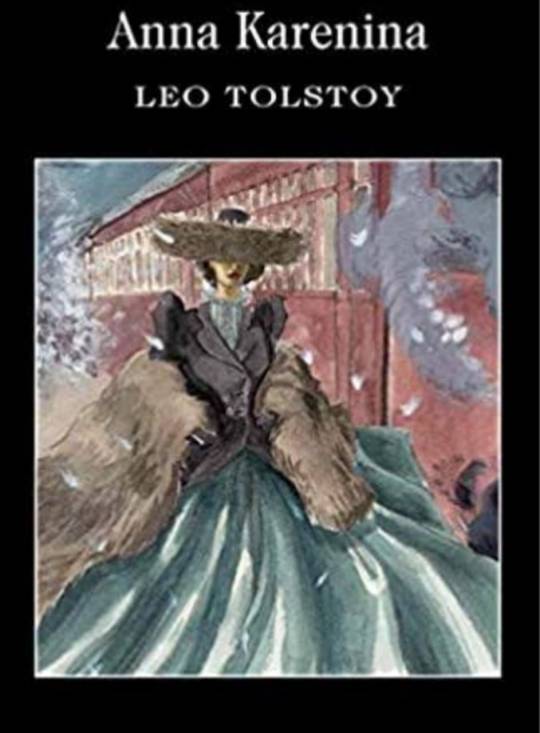
Review: Any fan of stories that involve juicy subjects like adultery, gambling, marriage plots, and, well, Russian feudalism, would instantly place Anna Karenina at the peak of their “greatest novels” list. And that’s exactly the ranking that publications like Time magazine have given the novel since it was published in its entirety in 1878. Written by Russian novelist Leo Tolstoy, the eight-part towering work of fiction tells the story of two major characters: a tragic, disenchanted housewife, the titular Anna, who runs off with her young lover, and a lovestruck landowner named Konstantin Levin, who struggles in faith and philosophy. The novel was especially revolutionary in its treatment of women, depicting prejudices and social hardships of the time with vivid emotion.
Save time, Buy here: https://www.amazon.in/gp/product/B00A7369M8/ref=as_li_tl?ie=UTF8&camp=3638&creative=24630&creativeASIN=B00A7369M8&linkCode=as2&tag=reviewbazaa0f-21&linkId=7ee06531a28c42e03bbcdb12c25981ba
2. One Hundred Years of Solitude
Author :- Gabriel Garcia Márquez
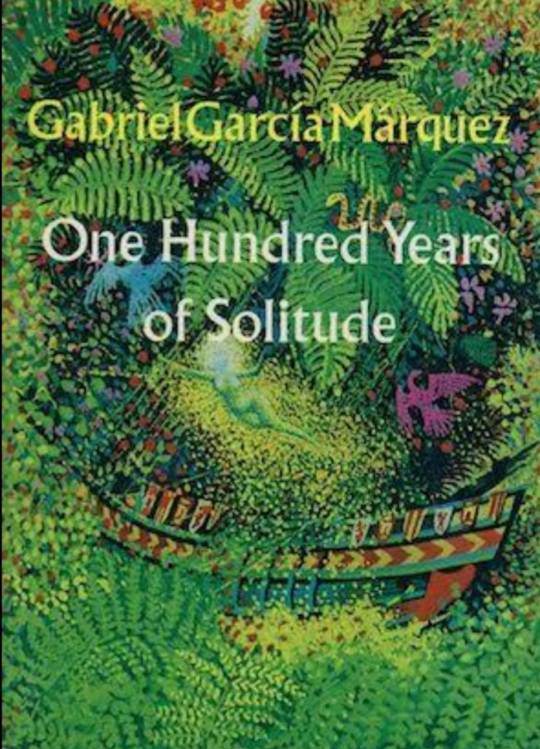
Review :- The late Colombian author Gabriel García Márquez published his most-famous work, One Hundred Years of Solitude, in 1967. The novel tells the story of seven generations of the Buendía family and follows the establishment of their town Macondo until its destruction along with the last of the family’s descendents. In fantastical form, the novel explores the genre of magic realism by emphasizing the extraordinary nature of commonplace things while mystical things are shown to be common. Márquez highlights the prevalence and power of myth and folktale in relating history and Latin American culture. The novel won many awards for Márquez, leading the way to his eventual honor of the Nobel Prize for Literature in 1982 for his entire body of work.
Save time, Buy here: https://www.amazon.in/gp/product/B00HVPSXNS/ref=as_li_tl?ie=UTF8&camp=3638&creative=24630&creativeASIN=B00HVPSXNS&linkCode=as2&tag=reviewbazaa0f-21&linkId=536466fc64f196107cb544bae95c677b
3. A Passage to India
Author :- E.M.Forster
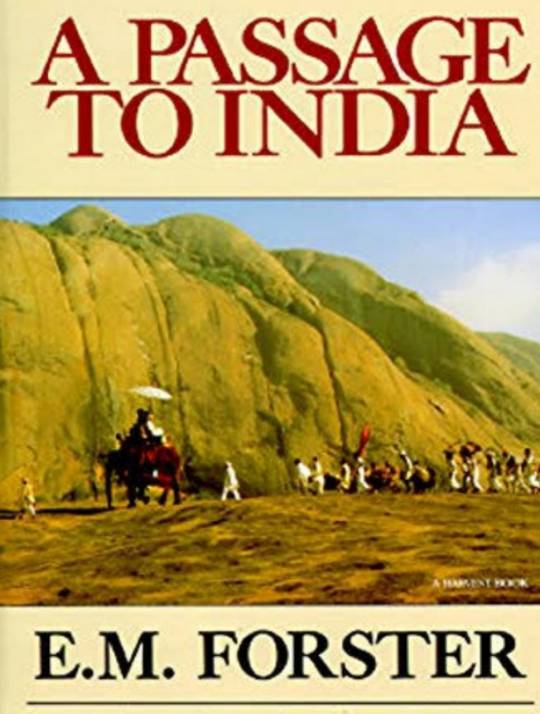
Review: E.M. Forster wrote his novel A Passage to India after multiple trips to the country throughout his early life. The book was published in 1924 and follows a Muslim Indian doctor named Aziz and his relationships with an English professor, Cyril Fielding, and a visiting English schoolteacher named Adela Quested. When Adela believes that Aziz has assaulted her while on a trip to the Marabar caves near the fictional city of Chandrapore, where the story is set, tensions between the Indian community and the colonial British community rise. The possibility of friendship and connection between English and Indian people, despite their cultural differences and imperial tensions, is explored in the conflict. The novel’s colorful descriptions of nature and the landscape of India.
Save time, Buy here: https://www.amazon.in/gp/product/B086FZH4T5/ref=as_li_tl?ie=UTF8&camp=3638&creative=24630&creativeASIN=B086FZH4T5&linkCode=as2&tag=reviewbazaa0f-21&linkId=f91fcd672d724ae4ce441f89e1d12377
4. Invisible Man
Author :- Ralph Ellison
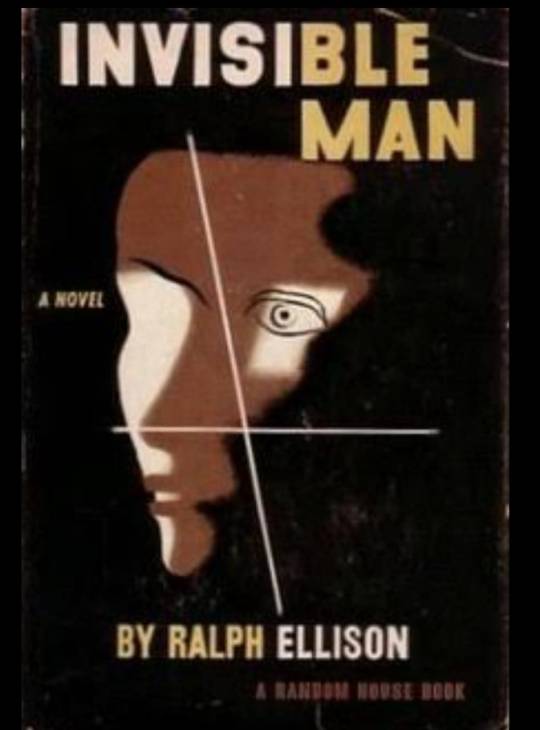
Review :- Ralph Ellison’s Invisible Man is a groundbreaking novel in the expression of identity for the African American male. The narrator of the novel, a man who is never named but believes he is “invisible” to others socially, tells the story of his move from the South to college and then to New York City. In each location he faces extreme adversity and discrimination, falling into and out of work, relationships, and questionable social movements in a wayward and ethereal mindset.
Save time, Buy here:
https://www.amazon.in/gp/product/B01D9ADQPI/ref=as_li_tl?ie=UTF8&camp=3638&creative=24630&creativeASIN=B01D9ADQPI&linkCode=as2&tag=reviewbazaa0f-21&linkId=811f792382d380d2b64fb08a9d7f2537
5. Don Quixote
Author :- Miguel de Cervantes
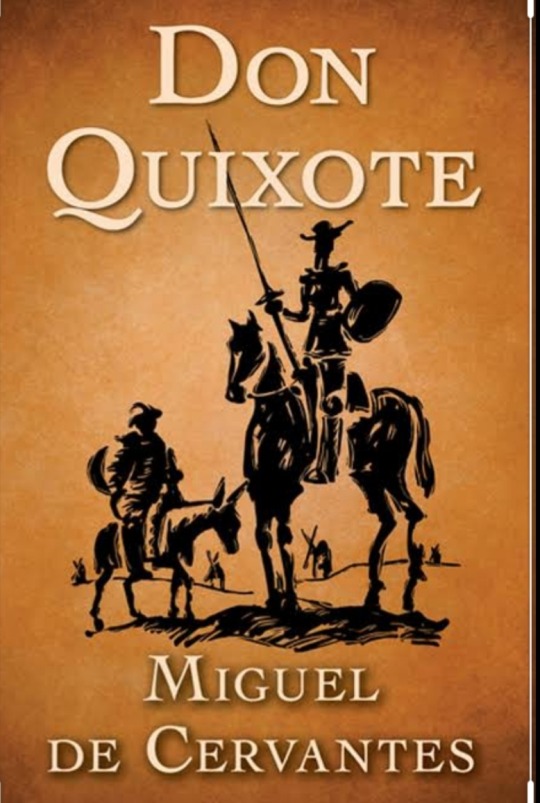
Review: Miguel de Cervantes’s Don Quixote, perhaps the most influential and well-known work of Spanish literature, was first published in full in 1615. The novel, which is very regularly regarded as one of the best literary works of all time, tells the story of a man who takes the name “Don Quixote de la Mancha” and sets off in a fit of obsession over romantic novels about chivalry to revive the custom and become a hero himself. The character of Don Quixote has become an idol and somewhat of an archetypal character, influencing many major works of art, music, and literature since the novel’s publication.
Save time, Buy here:
https://www.amazon.in/gp/product/B0774WXJKZ/ref=as_li_tl?ie=UTF8&camp=3638&creative=24630&creativeASIN=B0774WXJKZ&linkCode=as2&tag=reviewbazaa0f-21&linkId=6db58d86c8f43b37fc6aa618912ad752
6. Beloved
Author :- Toni Morrison
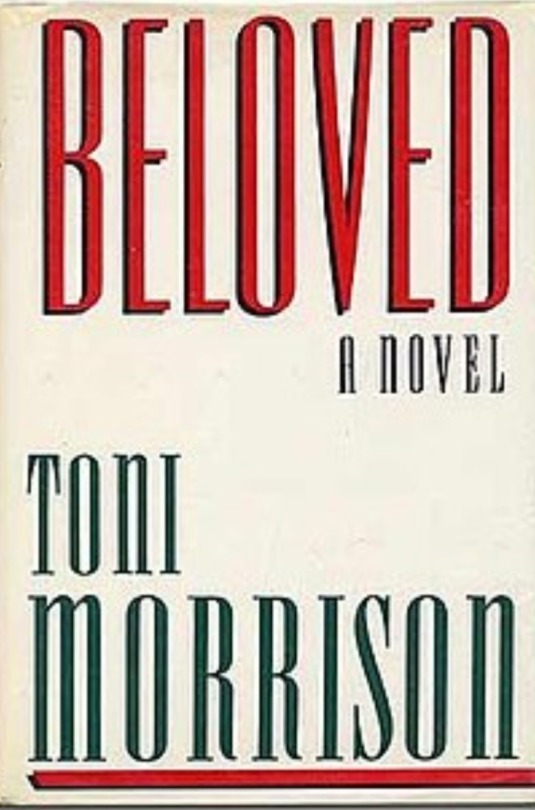
Review: Toni Morrison’s 1987 spiritual and haunting novel Beloved tells the story of an escaped slave named Sethe who has fled to Cincinnati, Ohio, in the year 1873. The novel investigates the trauma of slavery even after freedom has been gained, depicting Sethe’s guilt and emotional pain after having killed her own child, whom she named Beloved, to keep her from living life as a slave. A spectral figure appears in the lives of the characters and goes by the same name as the child, embodying the family’s anguish and hardship and making their feelings and past unavoidable.
Save time, Buy here:
https://www.amazon.in/gp/product/B00N3Q0SZK/ref=as_li_tl?ie=UTF8&camp=3638&creative=24630&creativeASIN=B00N3Q0SZK&linkCode=as2&tag=reviewbazaa0f-21&linkId=905d7bbcbebc07a24d1b901cba025bff
7. Mrs. Dalloway
Author :- Virginia Woolf
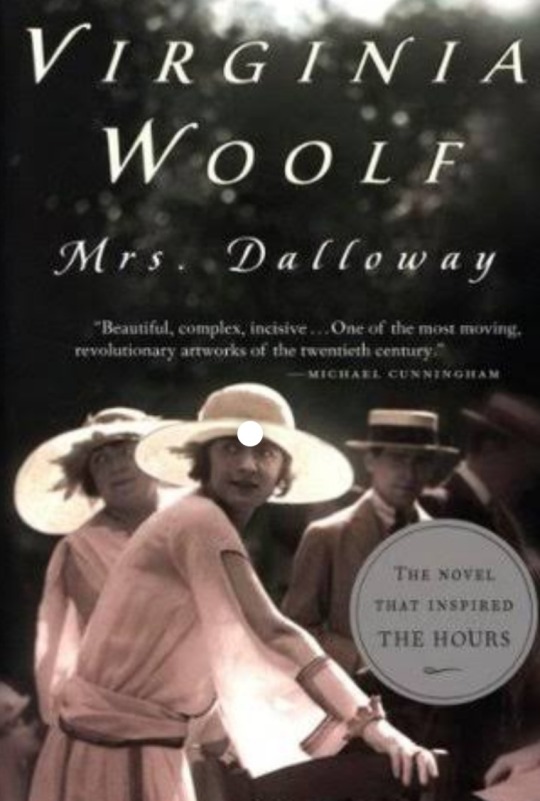
Review: Possibly the most idiosyncratic novel of this list, Virginia Woolf’s Mrs. Dalloway describes exactly one day in the life of a British socialite named Clarissa Dalloway. Using a combination of a third-person narration and the thoughts of various characters, the novel uses a stream-of-consciousness style all the way through. The result of this style is a deeply personal and revealing look into the characters’ minds, with the novel relying heavily on character rather than plot to tell its story. The thoughts of the characters include constant regrets and thoughts of the past, their struggles with mental illness and post-traumatic stress from World War I, and the effect of social pressures.
Save time, Buy here:
https://www.amazon.in/gp/product/B088PZTNJ8/ref=as_li_tl?ie=UTF8&camp=3638&creative=24630&creativeASIN=B088PZTNJ8&linkCode=as2&tag=reviewbazaa0f-21&linkId=727d9a1dcce6d50648cae8649de6a259
8. Things Fall Apart
Author :- Chinua Achebe
Review: The Western canon of “great literature” often focuses on writers who come from North America or Europe and often ignores accomplished writers and amazing works of literature from other parts of the world. Chinua Achebe’s Things Fall Apart, published in 1958, is one such work of African literature that had to overcome the bias of some literary circles and one that has been able to gain recognition worldwide despite it. The novel follows an Igbo man named Okonkwo, describing his family, the village in Nigeria where he lives, and the effects of British colonialism on his native country.
Save time, Buy here: https://www.amazon.in/gp/product/B00C7EGV5U/ref=as_li_tl?ie=UTF8&camp=3638&creative=24630&creativeASIN=B00C7EGV5U&linkCode=as2&tag=reviewbazaa0f-21&linkId=74a122deaa3a31b86c00ccf4dd719ea5
9. Jane Eyre
Author :- Charlotte Brontë
Review: Jane Eyre, another novel often assigned for reading in school, was initially published in 1847 under the pseudonym Currer Bell to disguise the fact that the writer was a woman. Fortunately, a lot has changed with regard to women in literature since 1847, and Brontë now receives the credit she deserves for one of the most-groundbreaking novels about women in history. At a time when the author felt compelled to hide her true identity, Jane Eyre provided a story of individualism for women.
Save time, Buy here: https://www.amazon.in/gp/product/B088Q7QYLD/ref=as_li_tl?ie=UTF8&camp=3638&creative=24630&creativeASIN=B088Q7QYLD&linkCode=as2&tag=reviewbazaa0f-21&linkId=d00c388a5d33085d3e7dc15426a80055
10. The Color Purple
Author :- Alice Walker
Review :- Though the epistolary novel (a novel in the form of letters written by one or more characters) was most popular before the 19th century, Alice Walker became a champion of the style with her 1982 Pulitzer Prize- and National Book Award-winning novel The Color Purple. Set in the post-Civil War American South, the novel follows a young African American girl named Celie into adulthood in letters she writes to God and to her sister Nettie.
Save time, Buy here:
https://www.amazon.in/gp/product/B006MOE1V2/ref=as_li_tl?ie=UTF8&camp=3638&creative=24630&creativeASIN=B006MOE1V2&linkCode=as2&tag=reviewbazaa0f-21&linkId=bac6d99d220148f525a84529e0675651
3 notes
·
View notes
Photo
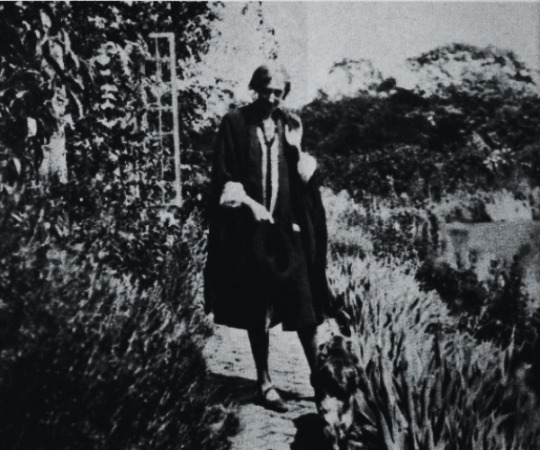
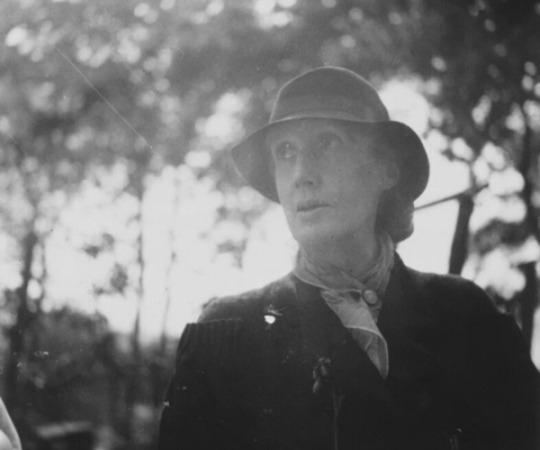
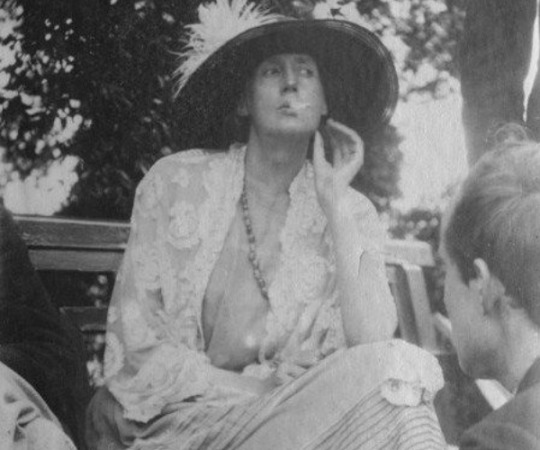
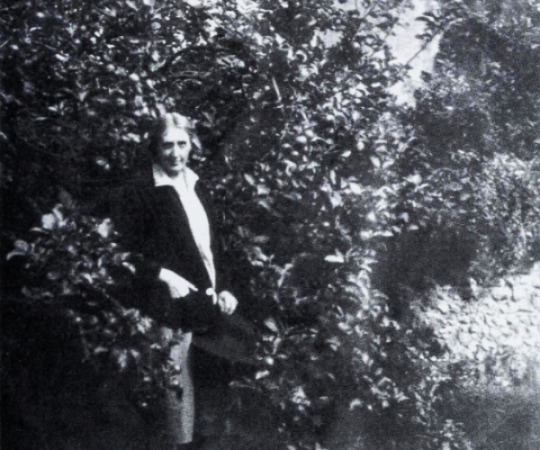
Virginia Woolf’s sapphic excerpts from her diaries between 1920 & 1930 (The Diary of Virginia Woolf, vol. 2 & 3)
Mentions of lesbianism & other sapphic symbolism & innuendos:
-Not a diary entry, but The Intellectual Status of Women, her response to a misogynistic paper in 1920, is included in vol. 2. She mentions Sappho several times, not so much about sapphic love but you and I can’t be fooled, can we? No straight woman is this obsessed with Sappho:
"Sir, –To begin with Sappho."
"Naturally, I cannot claim to know Greek as Mr Bennett and Affable Hawk know it, but I have often been told that Sappho was a woman, and that Plato and Aristotle placed her with Homer and Archilocus among the greatest of their poets."
-Diary entries, in chronological order:
"[Vita Sackville-West] is a pronounced Sapphist, & may, thinks Ethel Sands, have an eye on me, old though I am. Nature might have sharpened her faculties. Snob as I am, I trace her passions 500 years back, & they become romantic to me, like old yellow wine."
"If one could be friendly with women, what a pleasure–the relationship so secret and private compared with relations with men. Why not write about it? Truthfully?" (before/while writing Mrs Dalloway)
“These Sapphists love women;" (after having slept with Vita Sackville-West)
"In short, my fears & refrainings, my "impertinence" my usual self-consciousness in intercourse with people who mayn't want me & so on–were all, as L. said, sheer fudge;" (after having slept with a woman for, what we assume, the first time)
"We go down to Charleston tomorrow, not without some trepidation on my part, partly because I shall be hang about with trailing clouds of glory from Long Barn which always disorientates me & makes me more than usually nervous: then I am–altogether so queer in some ways." (after having slept with Vita Sackville-West)
"The Nicolsons got sleepy: H. curled up with his head on V.'s knee. She looked like Sappho by Leighton, asleep"
"Morgan was here of the week end; timid, touchy, infinitely charming. One night we got drunk, & talked of sodomy, & sapphism, with emotion–so much that the next day he said he had been drunk. [...] Would you like to be converted?" Leonard asked. "No" said Morgan, quite definitely. He said he thought Sapphism disgusting: partly from convention, partly because he disliked that women should be independent of men."
"Here is a note barely dashed off [...] after Christabel MacClaren; & her "winkle" party, as I call it, the other night. I mean she picked me out with a pin–about Lesbianism, & Dotty–(she is not one)."
"Is this the 'natural' attitude between the sexes?" (speaking about attraction between a man and a woman)
"I am just back from Long Barn, [...] & I have just eaten a pear warm from the sun with the juice running out of it."
"I had some interesting moments [with Ethel Smyth]. About jealousy for instance. ‘D'you know Virginia, I don't like other women being fond of you.’ ‘Then you must be in love with me Ethel.’ ‘I have never loved anyone so much. Ever since I saw you I have thought of nothing else.’"
Mentions of her blatant, although largely downplayed & self-censored, lesbian crush on & later affair with Vita Sackville-West, because lesbianism is about woman-loving:
You can also check this post, which lists all of the ways she uses to describe Vita in these diaries. You will find some of it below, but it will mostly be about Virginia’s feelings here, rather than on how hot Vita’s legs looked, even if that’s an iconic lesbian moment well on its own.
Diary entries, in chronological order:
"I am too muzzy-headed to make out anything. This is partly the result of dining to meet the lovely gifted aristocratic Sackville West last night at Clive's."
"a bead dropped into her plate at dinner–given to Clide–asks for liqueur–has her hand on all the ropes–makes me feel virgin, shy, & schoolgirlish."
"But as a body hers is perfection. So many rare & curious objects hit one's brain like pellets which may unfold later."
“Oh yes, I like her; could tack her on to my equipage for all time;"
"She is doomed to go to Persia; & I minded the thought so much (thinking to lose sight of her for 5 years) that I conclude that I am genuinely fond of her."
"And Vita comes to lunch tomorrow, which will be great amusement & pleasure. I am amused at my relations with her: left so ardent in January–& now what? Also I like her presence and beauty. Am I in love with her? But what is love?"
"But I was saying I should on the whole be confident about this French journey–that it will turn out well. I'm afraid of the morning most; & 3 o'clock in the afternoon; & wanting something Vita does not want."
"And I shall love the freedom from hours; & looking about; & the thought of coming back; & sitting talking, & some things I shall read; & one or two views, &–" (ugh the censorship)
"I am going to read; to think. I gave up reading & thinking on the 24th of Sept when I went to France [with Vita]."
And Pinker came back &–" (the dog was at Vita’s)
"For as I learnt later, I had broken in upon the height of [Geoffrey Scott’s] affair with Vita. [...] she told me how he was waiting for her, had left his Villa Medici & Lady Sybil on her account; & was now fuming in a mews off Regent's Park expecting her while she sat at Tavistock Square talking to me. [...] He called me 'that woman'.” (I just love it when she brags about being in Vita’s favours)
"Another reflection–nothing is so tiring as a change of atmosphere. I am more shattered & dissipated by an hour with Leonard’s mother than by 6 hours–no, 6 days, of Vita."
"Well, as I was saying, between these long pauses [...], I felt the spring beginning, & Vita's life so full & flush; & all the doors opening; & this is I believe the moth shaking its wings in me."
Mentions of men being attacked for not being as interesting/attractive as women are, because even though lesbianism isn’t about man-hating, it is a valid sapphic hobby:
-From The Intellectual Status of Women (this is one quote but the whole thing in meant to burn men tbh):
"though women have every reason to hope that the intellect of the male sex is steadily diminishing"
-Diary entries:
"Woman haters depress me, & both Tolstoi & Mrs Asquith hate women."
"I daresay Harold [Nicolson] has not got them [Vanessa Bell and Duncan Grant]; at the same time, there is good deal in him I like: he is quick & rash & impulsive; not in our sense, very clever; uneasy; seeming young; on the turn from diplomat to intellectual; not Vita's match; but honest & cordial."
"her I liked; him I hated. A woman is in someways so much better than a man–more natural, juicy, unfettered."
"Nobody has died, to my knowledge, of much interest." (on the recent death of Geoffrey Scott, Vita’s ex and abusive boyfriend)
Thank you @darlingvita for helping me find Virginia’s dykiest pictures !
#this one's for you kate even though you read all of it on twitter already#virginia woolf#virginia woolf's diary#quotes#vita sackville-west#vita and virginia#i'm sure there's many other moments i missed because i didn't read aaaall of it#but here you go
68 notes
·
View notes
Link
The seemingly unassailable world of the male creative genius seems to be crumbling: Roman Polanski and Bill Cosby were recently expelled from the Academy of Motion Picture Arts and Sciences, Junot Diaz stepped down as Pulitzer Prize chair after multiple women have spoken out about his pattern of harassment; and, 10 years after David Foster Wallace’s death, Mary Karr is reminding the world of his persistent abuse and stalking. In this unique social and political moment, a previously untouchable artistic archetype has finally become something close to vulnerable.
Genius is power. It is unquantifiable, uncontainable, and like beauty, exists in the eyes of the beholder. Genius enhances access—sexual, social, economic, political. It is a collective agreement—or, in many cases, a collective lie—that grants boundless latitude to those we anoint with the title.
But genius is also an indelibly gendered currency used by men—almost always men—of means and success to purchase license. The lie of genius is inextricable from the lie of meritocracy: Culture dictates that these men have risen to fame and success because of their unstoppable genius. But now that so many geniuses stand accused of abuses of power including sexual assault and violence; and as debates about separating the art from the artist spill into every corner of media and pop culture, the aesthetic alibi that artistic genius exists unfettered by lowly considerations like morality may no longer hold up under scrutiny.
With the rise of auteur theory in the mid–20th century, film joined the ranks of other fine arts, like painting and writing, that have long cultivated the mythology of the genius. Auteur theory, originating in French film criticism, credits the director with being the chief creative force behind a production—that is, the director is the “author.” Given that film, with its expansive casts and crews, is one of the most collaborative art forms ever to have existed, the myth of a singular genius seems exceptionally flawed to begin with. But beyond the history of directors like Terrence Malick, Woody Allen, and many more using their marketable auteur status as a “business model of reflexive adoration,” auteur worship both fosters and excuses a culture of toxic masculinity. The auteur’s time-honored method of “provoking” acting out of women through surprise, fear, and trickery—though male actors have never been immune, either— is inherently abusive. Quentin Tarantino, Lars Von Trier, Alfred Hitchcock, Stanley Kubrick, and David O. Russell, among others, have been accused of different degrees of this, but the resulting suffering of their muses is imagined by a fawning fanbase as “creative differences,” rather than as misogyny and as uncompromising vision rather than violence. Allegations that Tarantino forced Uma Thurman, for instance, to disastrously perform her own driving stunt in Kill Bill: Volume 2—as she put it, part of a dehumanization “to the point of death”—is not dissimilar to Alfred Hitchcock’s torment of the actress Tippi Hedren, both dynamics masquerading as artist-muse relationships transcending common sense. As Imran Siddiquee writes of genius directors and abusive behavior: “Many of the ‘greatest’ artists in our most influential visual artform continue to be celebrated for their own obsessive, often abusive exercises of power and control.”
Daniel Day-Lewis’s temperamental dressmaker Reynolds Woodcock in 2017’s critically lauded Paul Thomas Anderson film Phantom Thread has all the makings of a genius: He is successful; he is considered a visionary by the elite; he is messy; he is twisted; and he preys on young women. Phantom Thread was a frontrunner in the Oscars race this year, along with Darkest Hour, a character study of of Winston Churchill at the dawn of Britain’s entry into World War II. Gary Oldman (alleged wife beater), won Best Actor for his role as Churchill; elsewhere at the Oscars, Kobe Bryant (charged with sexual assault in 2003) won for best animated short. Guillermo Del Toro took home the Best Director Oscar for The Shape of Water, which also won Best Picture—and while the film’s win is notable given that no film with a female protagonist has won the award in 14 years, Del Toro’s explicit supportof Roman Polanski (accused of sexual assault by five people; charged with drugging and raping a minor and then fleeing the United States to avoid sentencing) make his position as a supposedly progressive director a tenuous one at best. The Academy Awards have always been deeply entrenched in establishment capitalism and Hollywood liberal lip service, but amid the flurry of the #MeToo and #TimesUp movements, the 2018 awards offered an instructive example of what still holds primacy in the film industry: the sometimes difficult and troubled, often abusive, and always male genius.
Men like Polanski retain artistic cred and social license because gatekeepers and fans argue that their cultural contributions outweigh their individual transgressions and crimes. It is not that passive consumers of art don’t recognize that their idols may be flawed: It’s that genius is imagined as a separate faculty that exists beyond ethics and morality. Genius is unemotional and objective, elevated beyond such paltry concerns. Of course the generous leaps of imagination and apologism offered to men of genius do not apply to women and gender-nonconforming creators, so if the latter should distinguish themselves, it is not because they are genius, but it is because they are “different.”
Superlative women have always been encouraged to believe they are notable because of an inherent “difference” from other girls; this difference is what distinguishes them in creative fields dominated by white men. I once thought I had the “androgynous mind” Virginia Woolf says is necessary to creativity. Mary Wollstonecraft, in her groundbreaking 1792 treatise A Vindication Of The Rights Of Woman, wondered whether the “few extraordinary women” in history were indeed “male spirits, confined by mistake to female frames.” Even Ursula K. Le Guin, whose revolutionary fiction challenged contemporary humanity’s preoccupation with gender, said some strange stuff about her own conception of herself as a “generic he,” a “poor imitation,” and a “substitute man.”
While we know it is both reductive and essentialist to reason this way, it’s historically understandable. The cultural misogyny that underlies the archetype of the male genius has ancient roots. According to Christine Battersby’s 1989 book Gender and Genius: Towards a Feminist Aesthetics, the 19th-century reworked an “older rhetoric of sexual exclusion” from Renaissance ideas about sexual difference in the arts (which were themselves based on the ancient Greeks and Romans). But the Romantics contributed something unique to “anti-female traditions”: While emotionality and expression—traditionally “feminine” attributes—rose in prominence, women themselves were further downgraded as artistic inferiors. Notes Battersby: “The Romantic artist feels strongly and lives intensely: the authentic work of art captures the special character of his experience.” And his art became his individualistic expression.
Originality and creativity wasn’t always inherent to artistic practice. Greeks thought of art as mimetic; the poet as a prophet; painting and sculpture pretty facsimiles of the natural world. The Middle Ages similarly viewed the artist as ungod-like, simply an imitator rather than a creator. The term “masterpiece,” had less to do with terrific originality and more to do with the “piece of work produced by an apprentice who showed sufficient skill.” A master was a “trade-union leader”—and women were active in these guilds as well. “Hostility towards women in the arts only increased when the status of the artist began to be distinguished from that of the craftsman…suitable only for the most perfect (male) specimens of humanity,” writes Battersby. She dates this change to when artists began gaining patronage during the Renaissance, freeing artistic creation from religious restrictions. In other words, when a great deal of money entered into the equation, art became profitable and it suited men to push out competition.
The modern term “genius” comes from the melding of two words: “genius,” a symbol of fertility represented by a little boy, and “ingenuity,” or skill. While Renaissance women lacked genius, they were artistic inferiors because they lacked “ingenium”—according to Juan Huarte’s 1575 Examen de Ingenius, men, in the Aristotelian fashion, were hot and dry; women, cold and wet, were a “lesser man.” (Aristotle also thought women were “flower pots” and sterile—creativity and procreativity both being male attributes.) Huarte’s physiological reasoning, though widely discredited, was later referenced by Schopenhauer, whose argument that women “lack all higher mental faculties” is a good example of Romantic reworking of cultural misogyny. (It might be worth noting that Schopenhauer is a well-known touchstone of Woody Allen’s many autobiographically based neurotic male protagonists.)
Further, madness and deviance were idiosyncrasies worked into the masculine artistic template. Artists, once expected to uphold societal values, became “countercultural” around the time of Lord Byron, who was once described by an ex-lover as “mad, bad, and dangerous to know.” The image of the antihero, the messy, the eccentric, the intoxicated artist persisted from the Romantic period through today. And while craziness was celebrated in the elite men, “female madness” was stigmatized. As Vox writer Tara Isabella Burton notes, the male artistic establishment begets the tortured, unruly genius sex: “That female flesh is the reward for a male job well done is not an uncommon cultural phenomenon in any field, but in the arts, that dynamic often takes on a faux-spiritual aspect.”
Even as the #MeToo movement picks up momentum, famous men who have sustained public critique in the past few months are already plotting their comebacks, with ample assistance from industry media. Tarantino, a man accused of choking Thurman and Diane Kruger for the sake of on-camera authenticity; who told Rose McGowan he used to jerk off to her; and who publicly defended Polanski, has unveiled his latest enterprise: a movie about Charles Manson. Charlie Rose has reportedly floated a comeback via a talk show in which he would interview men like Louis C.K. brought down by#MeToo—thereby facilitating their own comebacks—and Matt Lauer apparently hopes to be back on television screens as well. Despite the recent spate of high-profile falls from grace, the culture of media and art world are arranged such that neither whisper nor lawsuit will be able to fell geniuses for long.
Those who try to separate the art from the artist are setting up an illogical argument: The art was alwaysseparated, which is why these male auteurs had the the license, the support, and the cover to victimize as they did and still make more celebrated art. In the aftershocks of predatory unveilings, we have seen multitudes mourn the loss of the genius of these men. We need to now consider that we have elevated what we’ve inscribed as genius at the expense of the humanity and potential of people they silenced, erased, and preyed upon. We need to examine the destruction wrought by the archetype, and acknowledge that we have let it fuel rape culture and sexual exploitation. We need to acknowledge that genius has been a construct all along—that it may not actually exist.
1K notes
·
View notes
Text
Rafael Barba (and Spencer Reid) / Holding Steady (Part Two)
Part One
Part Three
As per @aprilfooledyou‘s request:
Imagine if you were a brilliant surgeon who was dating Spencer Reid, until he broke your heart since he thought he wasn’t good enough for you. Disheartened, you move to New York and meet Rafael Barba.
I’m back with another part! This originally was going to be the last part, but I decided I wanted to explore the reader’s relationship with Rafael a bit more in this part, and how Rafael is different for the reader that Reid was. Hold tight for Part three which will most likely be out sometime tomorrow. Enjoy!


The next week you spent with Rafael was a blur. You two continued to meet at the kiosk, learning a little about each other each time. You quickly learned he was a bigshot ADA who prosecuted criminals guilty of sex crimes and advocated for victims. He was sarcastic, even sardonic, half the time about his work, but you could tell that it was a way of coping. The things he dealt with were so graphic and having the pressure of trying to achieve justice, the stakes were always high, and the cases were never easy. He learned you were a heart surgeon, originally from Virginia. “From Virginia to New York? What made you move to this quaint little town?”
You chuckled, as you stepped over the contents of a spilled garbage can. “Quaint isn’t exactly how I would describe New York, it’s homely if anything,” He laughed, his eyes crinkling at the corners, and face lighting up. “I moved here after I got a job offer, and it just seemed like it was…time,”
“Time?” He pressed, quirking a single eyebrow. “There seems to be something you’re not telling me,” You sighed, he was too sharp for his own good. You weren’t exactly surprised. It was in his job description.
“How about you ask me out to dinner before you start running an investigation?” You retorted, and he paused, tilting his head, before nodding.
“Deal. How about dinner tonight?” You stopped in your tracks, staring at him. He wasn’t joking. “Come on, is my company that bad?”
“I-I just didn’t think you were serious,” You shook your head out of your stupor. You bit your lip. Rafael was attractive, you weren’t denying that. He was intelligent, kind, sarcastic as hell, and a great dresser to boot. But you were still afraid; afraid of getting hurt. After Spencer had left you, you hadn’t thought you would ever be happy again, but you realized at that moment, you hadn’t thought of Spencer this entire week. Instead, your thoughts were preoccupied with… You finally looked back at Rafael who was waiting for an answer. You smiled genuinely, “Deal,” Holding out your hand to shake his, and he took it firmly.
“I still can’t believe you’ve never read Slaughterhouse Five,” Rafael scoffed, taking a sip of his scotch. “And you call yourself well read?” He had taken you out to an intimate little restaurant, you weren’t too familiar with New York, so you couldn’t make any recommendations, but it wasn’t a problem for New Yorker like Rafael. He had reserved a corner booth for the two of you, both romantic and private.
“Hey, you’re the one who hasn’t read any Jane Austin or Virginia Woolf, at least I’ve read Vonnegut’s other works,” You crossed your arms, indignant.
“Fine, I’ll read Mrs. Dalloway, if you read Slaughterhouse Five,” You couldn’t help but grin, as you held out your hand to shake his to officiate your second deal. But instead he took your hand in his own, and kissed the back of your hand slowly. His eyes never left yours as he did it. He smirked at your sharp intake of air, as he slowly kissed his way up your shoulder, before reaching your lips. He hovered over them, pausing. “Is this okay?” He practically breathed, his words hot on your lips, as you licked them. Rafael Barba wasn’t the type to waste time on someone he wasn’t interested in, or waste time jerking around with someone he was very much interested in. Your hand was warm in his own larger one, he held it as if you were made of glass, but firmly, reassuring you that this was very real to him. Completely steady.
You answered his question by leaning in.
Over the next three months, the two of you spent every free moment (and some that weren’t so free) together. Though you were nervous at first of getting into a relationship with someone after what had happened the last time, you had never been happier. Rafael was sweet, kind, loving, and, most importantly, here. Even with his hectic schedule, he still made time for you. Whether it was a quick coffee break in between cases, a nice lunch in his office, or a romantic dinner out, there wasn’t a day where you didn’t hear from him.
Even if the tiniest thing was bothering you, he was able to tell. “How do you know, Raf?” You had asked one time, when Rafael had picked up on something bothering you (which was an argument with a co-worker about a patient)
“It’s not that hard if you pay attention, mi amor,” He kissed your hands. “You wring your hands whenever you’re stressed, you end up spacing out a lot during our conversation, and you tend to think out-loud,” He added, much to your surprise and embarrassment.
You didn’t bother denying it. It was true. “You’ve heard me?” You squeaked out, completely red. He couldn’t but laugh at your reaction; blushing cheeks, lips stuck in a perpetual pout, and eyes that wouldn’t quite meet his own. “I should stop doing that…”
“Don’t worry,” He pressed a kiss to your forehead. “I like you just the way you are,”
However, you couldn’t help but think there were things Rafael wished he could change. In particular, on your three month anniversary, Rafael had cooked you dinner and taken you out on his balcony in his loft. He set up a picnic with a basket full of food, a warm blanket, and even a playlist of both of your favorite songs. “Consider this my mixtape to you.” He had told you, before kissing you and sitting you down for dinner. The two of you had a perfect evening under the stars, now wrapped up in the blanket, laying down. Your head was curled into Rafael’s shoulder, his arm wrapped around you.
“This is perfect,” You sighed contently, turning to meet his gaze that was fixed on you.
“You’re perfect,” He told you, and you rolled your eyes, grinning.
“That’s probably the corniest thing you’ve said to me,” You laughed, as your chuckles faded, you realized he wasn’t laughing. “What’s wrong?”
“Y/N, I love you,” He finally said, his hand came up to brush against your face. The words seemed to spill from his lips without reservation. “I love your laugh; I love your undeniable wit and intelligence; I love that you laugh at almost everything I say, funny or nor; I love that you hate to lose, but you are the most selfless person I know, and I…love you,” He simply said, unable to articulate it any better. You were speechless, you didn’t know what to say, and so you didn’t say anything. You sat up. “Y/N? Are you okay?”
“I like you, Rafael, a lot, but I don’t think I’m ready to say that-” Rafael got to his feet, turning his back on you as he headed back inside. You scrambled to your feet, following him. “No, Raf, please. You don’t understand. I -”
He whirled around. “I understand perfectly, you don’t love me back,” He said bitterly, and the furious words tore through your heart with ease. “So why are you still here?” His tone was ice cold, freezing you in place. You knew Rafael, you knew his history. The women he dated in the past, he was just as afraid of this as you. He too had built walls you had to tear down brick by brick. And now his had finally tumbled down completely tonight, only to be raised anew.
You approached him hesitantly, “Raf, I do think I love you,” You said, the last words coming out barely a whisper. “But I’m just not ready to say it yet,” You sighed, crossing your arms. “You know my last relationship went downhill right after we said I love you to each other. I’m just afraid,” Your voice wavered, and you saw his walls begin to crack, as his eyes turned from anger to sympathy. “the same thing will happen to us,”
“Mi amor, I-” You held up your hand, making him listen to you. You couldn’t bear the thought of hurting him anymore than you already had tonight.
“I know it’s stupid, and it’s not fair to you, but I just don’t think I’m ready to say it yet, I’m scared.” You admitted, sniffing. You had to hold it together, for him. You weren’t about to guilt him back into a relationship. He deserved to be happy. You grabbed your coat, walking toward the door. “And if you want to break up, I understand-” He crossed clear across the room, breaking off your sentence with a kiss that stole the very words out of your mouth. He grasped your hands in his own, holding them tightly.
“Don’t you even consider that,” Rafael breathed, his hands moving to hold your face between them. “I know your ex hurt you, and you’re not ready to talk about it yet,” You still hadn’t told him the exact details about you and Spencer yet. It had been too painful to discuss. “but I’m not going to quit just because it’s a little tougher now. Now that I know I’m in the running,” You hugged him tightly, letting his warmth envelop you. He wasn’t just in the running, he was it.
A few weeks later, Rafael later did you a huge favor by attending the hospital’s annual charity event with you. It took some persuasion on your part, but Rafael couldn’t resist a chance to get dressed to the nines with you. No one could keep their eyes off the two of you when you entered the ballroom. You entered in a midnight blue gown with Rafael beside you in a matching three-piece-suit. The two of you stood at the sidelines for a few minutes, talking and listening to the band, before Rafael stepped out, holding his hand out to you. “May I have this dance?”
“Hm, I’m not sure,” You crossed your arms, pursing your lips with a playful expression. You grabbed his arm, pulling him in close. “I could use a bit of convincing,” He smiled, pressing a kiss to your lips, short enough to not draw any unwanted attention, but long enough to convince you. You grinned at him, as he escorted you onto the dance floor. “I have to warn you, I have two left feet,” You said nervously, glancing around the ballroom at the other dancers.
Rafael’s hand was at your waist, his other holding yours. “Do you trust me?” You nodded, biting your lip. “Dancing is all about trust. Just follow my lead.” Rafael spun, twirled, and moved you around the dance floor as if the two of you were professionals. You could hear his quiet encouragements in your ear. You began to give yourself up, immersing yourself in the moment, all you could feel was your body on his, as the two of you maintained eye contact as you moved together, feeling as if you were one. Then, the song ended, and it felt as if you had been transported to another planet and just began your descent back. “Are you okay?” Rafael asked, brushing your hair out of your face. “You look flushed,”
Without another word, you pulled him out of the ballroom, and got into a cab, you took him to your apartment, where you sat him down. “Mi amor, you’re scaring me, what’s wrong?”
You sighed, and finally you told him, “Almost a year ago, I was dating Dr. Spencer Reid of the FBI,” And you explained, how you and Spencer began dating, how it seemed so perfect, and how it so easily fell apart without much of an explanation. “After that, I was afraid, afraid to be in a serious relationship, afraid to date you, afraid of falling in love, and then losing you,” You told him. He let you speak, listening intently, as you grabbed his hand. Your hands fit together so perfectly, like a puzzle. “But now, I can’t let this control my life anymore. I love you, Rafael, I have for a long time, and I’m not afraid to love you anymore,” You told him, “I love everything about you. I would make a list, but I think we would die before I’d finish,” You chuckled, your voice wavering. He captured your lips in a kiss, and between each breath you took, you whispered it to him reverently, “I love you, I love you, I love you,” And you showed each other how much you truly did love one another. For the first time, it felt as if you finally free of Spencer Reid.
Or so you thought.
#rafael barba#rafael barba x oc#rafael barba fanfic#rafael barba x reader#ada rafael barba#rafael barba x you#barba x reader#rafael barba fanfiction#law and order#law and order svu#law and order: special victims unit#law and order imagine#svu imagine#svu fanfic#criminal minds#criminal minds imagine#criminal minds fanfiction#spencer reid#spencer reid x reader#spencer reid x you#spencer reid x oc#spencer reid fanfiction#reid x reader#reid x oc#reid x you#raul esparza#matthew gray gubler#mgg
243 notes
·
View notes